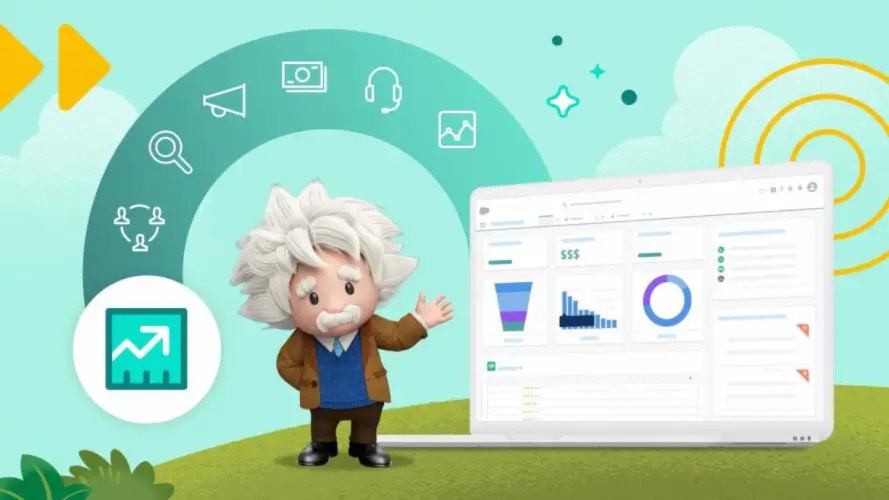What’s Stopping Australian Sales Teams From Embracing AI?



Sales is a very human discipline, so it makes sense that some sellers are hesitant about the benefits of AI. Discover how a collaborative approach with AI not only preserves but enhances the personal touch in sales, for stronger and more meaningful customer connections.

Relationship-building has always been at the heart of sales, so it’s no surprise that the rise of AI has some people questioning where humans will fit into the future of selling. Jeremy Smith, Area Vice President, Head of Commercial at Salesforce, explains why generative AI can not only preserve but enhance the human-centric nature of sales and deepen customer trust.
Success in sales comes down to a key principle: knowing your customer. For Australian customers, who place a high value on honesty and authenticity, a seller’s ability to build a trusting relationship can make or break a sale. In a country that values the human element of sales so much, it makes sense that some sales professionals are hesitant about adopting AI, with concerns ranging from data privacy to the loss of personal touch in customer relationships.
This scepticism may in part be due to the use of generative AI that many are familiar with. You enter a generic prompt and receive a generic response that’s based on generic data. It’s impersonal and does nothing to build trust. If this were all AI could be, then it would be understandable for sellers to raise an eyebrow at the effectiveness of AI.
At Salesforce, we approach AI differently. With the formula of CRM + AI + Data + Trust, Salesforce can help sellers use data to enhance the human element of sales, not lose it.
How AI generates not just content, but leads as well
While generative AI is best known for content generation, there are other impactful applications for sales professionals.
According to the 2023 Salesforce Generative AI Snapshot Series, the most common use of generative AI in sales is still basic content creation, used by 82% of Australian sellers. But more exciting use cases are starting to catch up. 74% of Australian sales professionals now use AI to analyse market data, while 71% are using it to automate personalised communications and build sales forecasts.
If sellers can shift their mindset from thinking about how AI can automate mundane tasks like basic email writing to how it can help them better know their potential customers, they will gain a trust advantage. AI tools like Einstein Sales AI can provide sales leaders with valuable insights efficiently, without the need to “double-click” down into the data.
Salesforce’s internal team began working with predictive AI when Einstein was launched back in 2016. Before this, sales managers would have to spend countless hours drilling into the data to surface opportunities that could be rolled out to sellers. Now, AI offers them up proactively. For example, Einstein opportunity scoring uses historical data to provide insights that help sellers progress opportunities to close.
Today, with the rapid innovations in generative AI, 91% of Australian senior sales managers think that AI will help their teams take better advantage of data. And we’re now seeing the incredible power of Einstein’s generative AI capabilities play out within Salesforce and among our customers.
There’s a key point to emphasise for any sales professionals who are on the fence about just how transformative AI can be for such a human profession – a collaborative approach between people and machines is at the core of AI for sales. AI isn’t inherently personal or impersonal. It’s how we use our human insights and discretion that will determine whether AI builds trust or breaks it.
I am already seeing a world where Australian sellers and their AI sidekicks (like Einstein Copilot) work together to win even greater trust from their customers. AI can combine insights from the private data already in your CRM with publicly available data such as company letters, research or earning reports to provide sellers with a more comprehensive understanding of their customers than was previously possible. Sellers can then use this customer snapshot for more personalised outreach and communications – the layer of human-centric sales that will always be needed.
Trends in Generative AI for Sales
Discover how generative AI is helping sales teams build trust and sell more, with insights from 1000+ sellers.




AI beyond sales
It’s not just sales teams who are having conversations about how AI will transform work. Marketing and service departments in Australia are also adopting generative AI, but not everyone is on board, yet.
As of 2023, the percentage of Australian desk workers who use or plan to use generative AI varied across departments:
- 83% of marketers use or plan to use generative AI
- 73% of sales professionals use or plan to use generative AI
- 45% of service professionals use or plan to use generative AI
While concerns vary from department to department, there is a common theme that businesses must take heed of when preparing to implement AI: workers are worried that machines will remove the human-centric nature of their work.
How to get started with trusted AI
Rest assured that regardless of department, AI needs human oversight to do its job well. It also needs a foundation of quality data to work from.
Here’s how it works: Data Cloud feeds your secure data into all of the apps in the Salesforce system, including Sales Cloud, Service Cloud and Marketing Cloud. Einstein is like the wrapper that sits on top of those systems to supercharge them. AI gives your teams the insights they need to work smarter while keeping them firmly in the driver’s seat.
Integrating AI into sales will transform not just how we work, but how we connect, understand and serve our customers. To make this a transformation that not only preserves but enhances the human-centric nature of selling, businesses need to define an AI strategy that places a premium on trust and human intuition. Follow the three steps in the AI Strategy Guide and you’ll champion a future where every sales interaction is as unique as the individual behind it, powered by AI but delivered with heart.
A three-step strategy for trusted AI
Read the AI Strategy Guide and roll out a human-centric approach to AI.























